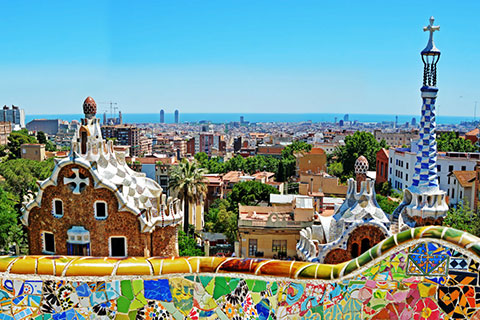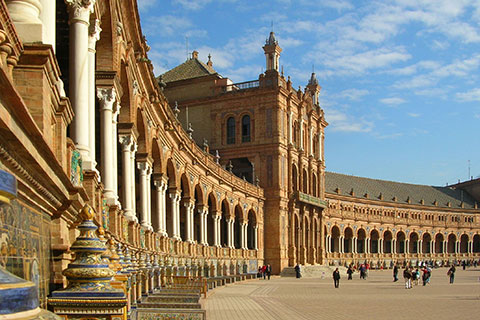
Study in Spain
Last edited on 26 Nov 2025
Welcome to Spain!
Spain is a country of contrasts, where the affluence and cosmopolitan bustle of Western Europe is mixed with a distinctive Southern European charm; where an expressive, rich culture and attractive lifestyle coexists with leading companies and top technological industries; and where distinct regional identities provide a special flavor. Of course, lifestyle alone isn’t enough to draw in the punters – you need to have good universities too!
Spain, a country of an extraordinary beauty, is home to some of the most ancient universities in Europe and the cradle to one of the most important languages in the world: Spanish. A member of the European Union since 1986, Spain has become the most popular destination for students within the educational exchange program Erasmus and for summer study abroad programs. Whatever your choice to study in Spain might be: a Bachelor's, Master's or PhD degree, or a summer study-abroad program, the Spanish educational system is designed to provide students with a wide range of subjects and study opportunities. While the usual language of instruction is Spanish, you will also find many degrees offered in English both partially and fully
Spain is the 13th largest economy in the world (International Monetary Fund 2018), the 6th largest in the European Union and to scientific power, and the main research areas where Spain has a large science base are health, ICT, Environment, Food and Agriculture, Energy, Material Sciences and Social Sciences. Spanish companies are internationally recognized for their leadership in clean technologies, health and biotechnology, 2nd largest investor in Latin America, after the USA. Similarly, Spain ranks as the world's 10th when it comes engineering infrastructure, ICT, manufacturing technologies, financial services and tourism, amongst others.
Spain is one of the most diverse and culturally rich countries in Europe. Culturally, it is mainly a Latin country with great strength of the Roman heritage, but with many influences in art and architecture, cuisine and music from many countries across Europe and the Mediterranean, throughout its long history. Owing to such a rich cultural past, Spain has gained a prominent place in the world map as far as higher education is concerned. In 2017, Spain ranked 2nd in Europe and 3rd in the world in terms of its number of UNESCO world cultural sites, just behind Italy. And it ranks 2nd in the world in terms of tourism arrivals, 82 million tourists travelled to Spain in 2017.
Higher Education System
Spanish higher education system is formed by 84 universities (50 public, the rest private), 511 research institutes and 66 science and technology parks, all distributed throughout the Spanish territory. The cities that concentrate the largest number of universities are Madrid, Barcelona and Valencia.
List of Spanish Universities:
https://www.google.com/maps/d/u/0/viewer?mid=1TZkeR94xUtSfYf-pyyLKdf4Qax1a2lLP&ll=40.17540993890334%2C-3.7180966660644117&z=4
Academic excellence, international recognition and research capacity of Spanish Universities: 5 Spanish Universities in the top 400 THE ranking (Times Higher Education 2018); 7 Spanish Universities in the top 150 under 50 THE (Times Higher Education 2018 Young University Rankings). Spanish universities contribute to 2/3 to the total scientific production of Spain with international visibility.
Worldwide leading MBA Schools like IESE, Instituto de Empresa and ESADE: in the top 20 Global MBA School (Financial Times 2017) and top 10 European Business Schools ranking (Financial Times 2017). Value of Spanish as a language: Spanish is the second most spoken language in the world, after Mandarin Chinese, and the primary, official or co-official language of 21 countries. This translates into the Recognition of Spanish University titles in more than 40 member countries of the European Higher Education Area (EHEA). This also facilitates the approval and recognition of Spanish qualifications in other countries outside of Europe, like the USA, Asia and Latin America.
The Spanish university access exam is required for foreign students in some Universities.
It is the preferred destination for postgraduate students and researchers from Latin America as well as top notch destination for European university students under the Erasmus+ Programme. Tuition fees and cost of living are lower compared to other European countries. There are over 90 undergraduate and 200 postgraduate courses taught 100% in English, and over 1000 courses taught partially in English. Here you can find more information on English taught Programs (Bachelor's and Masters) at Spanish Universities:
http://www.sepie.es/internacionalizacion/what-to-study-in-spain.html
Universities in Spain
Student Cities in Spain
Madrid

As in any historic European capital worth its salt, in Madrid you will find fast-paced modern life taking place against a backdrop of beautiful historic architecture. One of the largest urban hubs in Europe, Madrid is a major international center for business and finance, also known for its world-leading arts and cultural venues. Among the most prominent of these are the three art museums which comprise the city’s so-called “Golden Triangle of Art”. Meanwhile, football fans will know the city for its team, Real Madrid, one of the world’s most recognized clubs. Many top international corporations in many fields are based in Madrid, since the city is a well-known hub for business with Latin America. The strong reputation held by Madrid’s universities among employers contributes to its placing as 31st of the world’s best student cities in 2017.
Madrid is home to some of the best Spanish universities, including four which feature in the QS World University Rankings (2018): Universidad Autónoma de Madrid (187th), Universidad Complutense de Madrid (joint 233rd), Universidad Carlos III de Madrid (joint 281tst) and Politécnica de Madrid (491-500).
Barcelona

Spain’s second-largest city, Barcelona, is the capital of Catalonia, a region to the northeast of Spain. It is one of the most aesthetically distinctive cities in Europe, dominated by daring modernist architecture, such as the spectacular creations of architect Antonio Gaudí. A famously youth-oriented city, it’s known for its vibrant nightlife and events such as the annual Primavera Sound music festival. On top of all of its urban delights, Barcelona also offers very close proximity to beautiful Mediterranean beaches. All of this makes of Barcelona a leading tourist attraction and the 23rd best student city in the world. Like Madrid, it too boasts one of the world’s most famous and successful football teams, popularly known as “Barça”.
Universities in Barcelona include some of the highest-ranked in Spain: the University of Barcelona (156th in the world), Universitat Autónoma de Barcelona (joint 195th), Universitat Pompeu Fabra (joint 296th) and Universitat Politècnica de Catalunya (joint 275th).
Valencia

Spain’s third-largest city, located on the coast about 350km south of Barcelona, Valencia is well known for being the spiritual home to the delicious rice-based dish paella. It is also home to the massive Las Fallas festival, where hundreds of giant puppets are paraded and then burned, as well as to Festival Internacional de Benicàssim, one of the biggest music festivals in Europe. It is a major tourist magnet, due to its beautiful beaches, attractive city center, museums and interest-packed “Ciutat Vella” (old town) – full of historic buildings and bustling bars. It is also a major commercial hub, with its outstanding seaport, the busiest in the Mediterranean in terms of trade.
Notable universities in Valencia include Universidad Politecnica de Valencia and the Universitat de Valencia, both of which make the top 600 of the QS World University Rankings.
Granada

Located in the south of Spain, in the region of Andalucía, Granada has a distinct multicultural feeling, the result of many centuries of cultural coexistence and mutual enrichment. The most famous example of this legacy is the spectacular Alhambra, a huge fortress and palace which overlooks the city. It is fair to say that Granada is a major student city, with the Universidad de Granada ranked within the global top 550. This large university hosts more than 80,000 students across its five different campuses, offering access to a large and diverse student community. Regional traditions in this part of Spain include a custom of serving free tapas with every drink you order – not a bad perk!
Seville

Another charming historical city, located towards the southwest of Spain, Seville is the capital of the region of Andalucía. Like most Spanish cities, Seville is known for its festivals (Semana Santa and the Feria de Sevilla are the biggest of their kind), and its tapas, but the city is probably most famous for being the cradle of flamenco – Spain’s national dance, and the accompanying music. In the modern age, Seville is also famous for its fascinating nightlife – so if you like to party into the early hours, this Spanish city should certainly be on your list. Universities in Seville are led by the sizeable Universidad de Sevilla (ranked 601-650 in the world).
Application, Fees and Visas in Spain
Applying to universities in Spain
There is no centralized application system for Spanish universities, and each institution will set its own entry requirements and deadlines – so be careful to check with the university itself. You may need to sit for an entrance exam, though EU students and others who have completed International Baccalaureates will often be exempt from this procedure.
If the degree is to be taught in Spanish, you will need to know the language in order to apply to it.
Student visas for Spain
The requirements for Spanish student visas depend on whether or not you’re from the EU. Students from Norway, Iceland, Liechtenstein and Switzerland are treated as EU students.
EU applicants:
You won’t need a visa to study in Spain, but will need to register at the Central Registry Office for Foreigners, from which you will receive a certificate confirming your right to study in Spain. In order to get this, you will need to present a passport or national identity card and proof that you’ve been accepted to a course.
Non-EU applicants: Spain student visa
You will need to apply for student visa type D in your home country. This comes in two formats; open and 180 days, so make sure that you apply for the right one. Exact requirements may vary. You will certainly need to have been accepted onto a course at a Spanish university, have purchased health insurance, and have sufficient funds (a letter confirming parental support is deemed sufficient). You may need to prove you don’t have a criminal record and provide a medical certificate. You should allow three months’ advance for processing.
You will be allowed to work part-time (up to 20 hours per week) if you have a work permit, so long as it does not adversely affect your studies.
Within 30 days of arrival you must also apply for an “Autorización de Estancia por Estudios”, a temporary permit which grants you the right of residence in Spain. It must be renewed annually.
Fees and funding
Applicants coming from the EU pay the same tuition fees as local students. These are usually between 740-6,000 euros per Bachelor degree and year at public universities, and between 5,500-18,000 Euros (~US$6,000-19,670) per year if you study at a private university. If you come from a non-EU country, your fees will be marginally higher in many public Universities. For exact information on your tuition fees, contact your chosen university or visit its website.
How much it will cost?
Bachelor Degree: 740 – 6,000 euros a year depending on the study program.
The prices for enrolment in Masters and Doctorate Programs in public universities are within a fixed rate of 17 and 65 euros per credit. Official Master's Degrees cost 800-19,000 euros per academic year).
Fees at private universities are established by the university itself.
Living Expenses for a year: 600-1,100 euros a month (including accommodation in a shared apartment), depending on the city. This cost is very competitive when compared to other European countries.
Fast fact
- Spain is a parliamentary kingdom. The current monarch is King Felipe VI.
- Bicameral legislature, the prime minister is currently Pedro Sánchez
- Along with France and Morocco, Spain is one of the only three countries to have both Atlantic and Mediterranean coastlines.
- Official language: Castilian, usually simply referred to as Spanish, which is the second most common first language in the world. Regional languages include Basque, Catalonian and Galician.
- Composed of 17 autonomous regions: Andalusia, Aragón, Asturias, the Basque Country, Cantabria, Catalonia, Extremadura, Galicia, La Rioja, Madrid, Murcia, Navarre, Castilla-la Mancha, Castilla-León, the Valencian Community, the Balearic Islands and the Canary Islands.
- Population: approx. 46.5 million
- Capital city: Madrid
- Area: 505.900 km2
- Currency: Euro (€)
- Central European Time (UTC+1), changing to Daylight Saving Time in the summer (UTC+2)
- International dialing code: +34
Probably you will think of Madrid and Barcelona when you first hear Spain. Well, these two cities are certainly hot tourist attractions. In fact, not only the beautiful countryside of Spain is just marvelous, every year thousands of students from across the world make their way to Spain to attend one of the 74 universities in the country.
Spain is rich in history and culture, and provides the total package for anyone coming to the area from international lands including English-thought program. But I assume that you choose Spain for a reason of experiencing the origin society, correct? Among those reputable universities, wide range of study program offered in Spanish language. There are many courses that you can take before enrolling in the actual classes that you want to take. These are certainly some of the reasons that you should study in Spain. However, these are just the beginning of the other great things that you will find and love while studying in the country. See search engine https://www.educacion.gob.es/socrates/internacionalizacionbecas/mantenimientobecas.do
Erasmus + LPDP Spanish Universities
Focus Scholarship: Bachelor, Master, PhD
Competition: worldwide
Scholarship Coverage: Ful and Partial Scholarship
Looking for an affordable tuition rate but fine education quality? In Spain, tuition fee at some colleges cost as little as 5,500 Euros per semester. Financial aid at this point is also wide-open for international students. Erasmus+ program, LPDP (Indonesian Endowment Fund), and almost all of the Spanish Universities offer financial support. You may access more information at European Scholarship Portal or exclusively in Spain Universities.





![Jajaran Universitas Spanyol di EHEF 2018 [Updated] Jajaran Universitas Spanyol di EHEF 2018 [Updated]](https://ehef.id/storage/app/uploads/public/5bd/ef0/1fc/5bdef01fcc863048795694.png)






